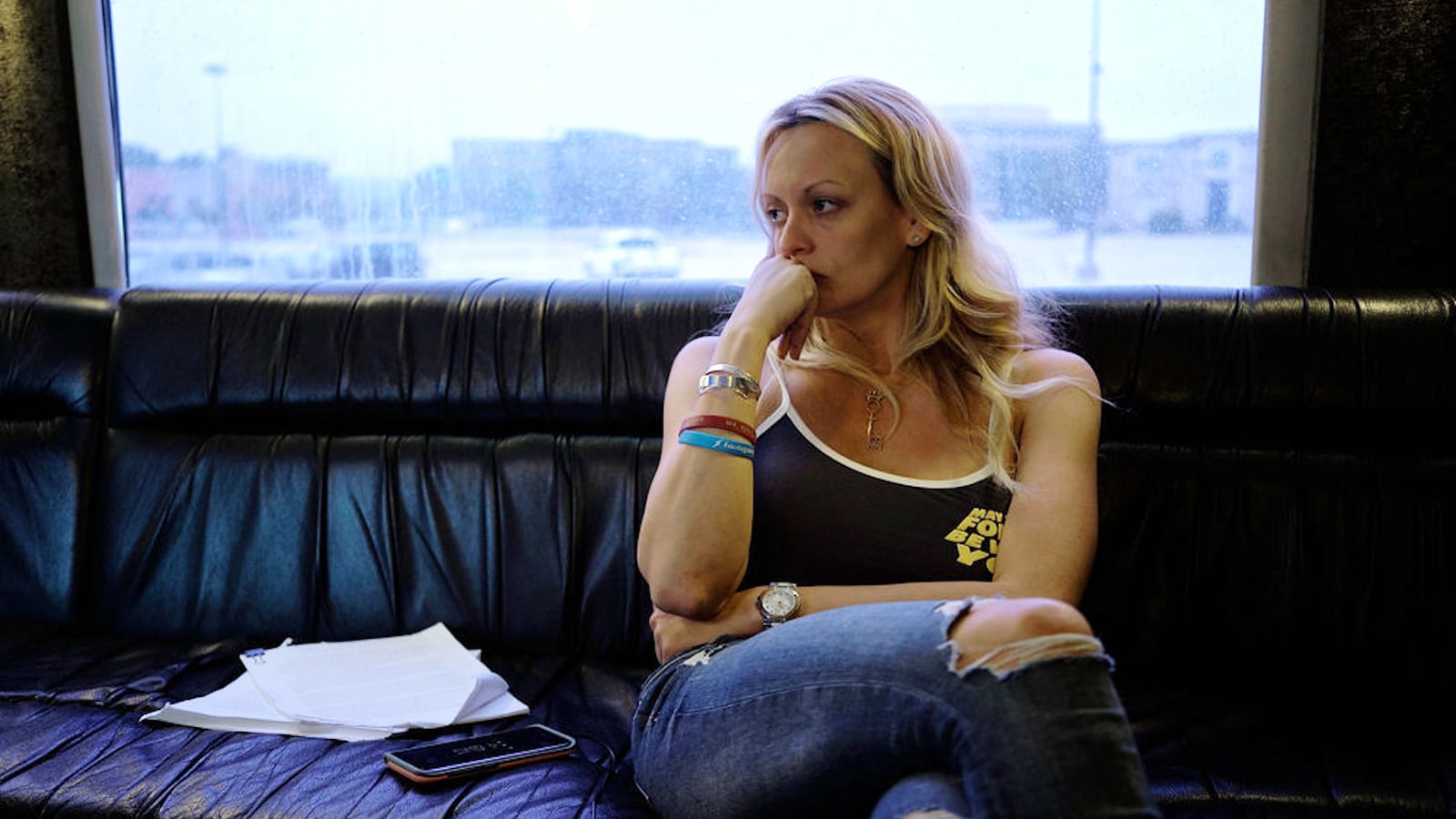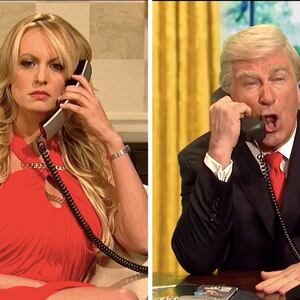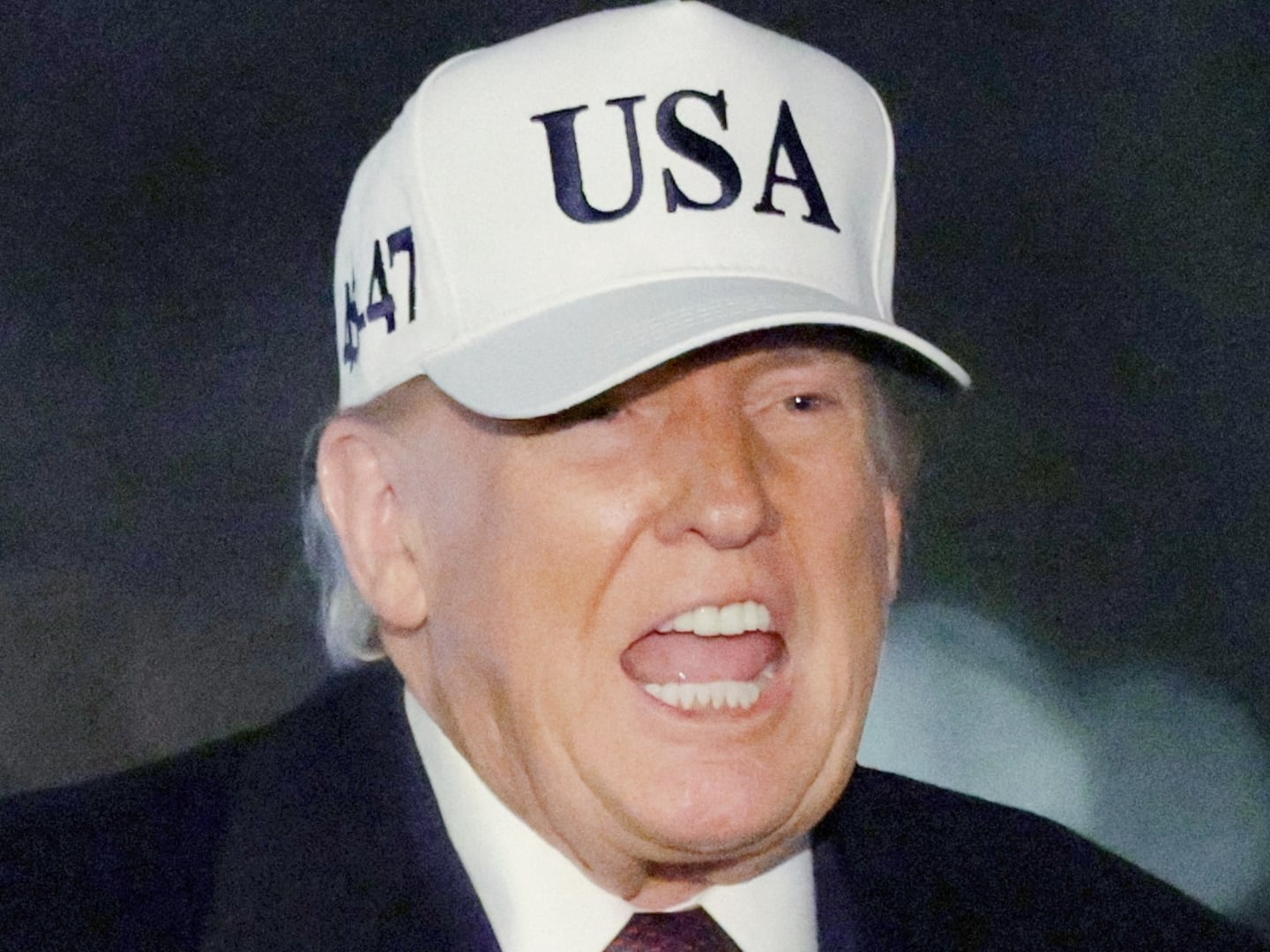Donald Trump is so peerlessly corrupt that he’s become a one-man cottage industry for the non-fiction genre, with myriad documentaries made—and undoubtedly still to come—about his various offenses.
To that list can now be added Stormy, a two-hour undertaking focused on one of Trump's sleaziest scandals: the $130,000 hush money payment made to adult actress Stormy Daniels via Trump’s lawyer Michael Cohen in order to keep their 2006 affair quiet on the eve of the 2016 presidential election. Trump’s possible criminal liability for that infraction (which prosecutors allege violated campaign-finance laws) will be determined later this month.
Thus, Sarah Gibson’s film is fortuitously timed, providing an insider’s view of this most tabloid-y of political tales and the woman at the center of it all, whose candidness is summed up by her closing statement here that “I’m out of fucks.”
Premiering on Peacock on March 18, Stormy is an up-close-and-personal account of Daniels’ experience being thrust into the national spotlight in early 2018, when her long-ago tryst with Trump became headline news. Gibson’s film spends its initial passages providing cursory background on the X-rated icon: her rough childhood in Baton Rouge, Louisiana, courtesy of an absentee dad and neglectful mother; her unplanned entrée into the porn world; and her third marriage to husband Glen, with whom she has a young daughter.
As Wicked Pictures executive Joy King remarks, Daniels wasn’t a bimbo starlet but “had a vision,” and later speakers similarly voice their respect for her intelligence as well as her tenacity and bravery—all qualities that were put to the test when she was suddenly and shockingly transformed into a household name.
Between archival clips and footage shot over the course of the past six years (much of it by journalist Denver Nicks), Stormy benefits from a wealth of instances in which Daniels speaks off-the-cuff about her harrowing ordeal. As she tells it, she met Trump at a July 2006 Lake Tahoe charity golf tournament, where she was invited to dinner with him.
“Who could take him seriously?” she says about the then-reality TV star, and her lack of fear was what convinced her to meet him at his hotel room when he was running late for their evening together. They had a respectful chat about business during which she claims that “he told me I reminded him of his daughter” and that he praised her as “really smart.” As a result, “I thought we had this mutual respect, which is why it was so crazy when, having no red flags whatsoever in a conversation, I came out of a bathroom to find myself cornered.” What ensued was sex that Daniels describes as “awful,” although she’s quick to note, “I didn’t say no.”
This fits with Daniels’ long-standing depiction of their encounter as both technically consensual and something akin to abusive coercion, especially for a woman such as herself who was brought up—and sexually molested—in a “white trash” southern milieu where girls were supposed to do as they were told by older men.
Stormy is definitely on its subject’s side. Yet Gibson is shrewd enough to include material that complicates sympathy for her, whether it’s Daniels acknowledging that she strung Trump along in the hopes of landing a job on The Celebrity Apprentice, or her decision to embark on a “Make America Horny Again” tour that prioritized opportunistic money-making over the health of her marriage to Glen (who divorced her for, among other things, having an affair with Nicks)—both of which speak to accusations that she simply wanted to profit off Trump.
Daniels, however, doesn’t pretend to have behaved perfectly during this nightmare, and by the conclusion of Stormy, she tearfully apologizes to Glen (“He didn’t deserve this”) for the marital mistakes that tore them apart. Moreover, the portrait painted by Gibson’s film is of a woman who repeatedly sought attention primarily to defend herself and her daughter legally and literally, given that in 2011—when news of the affair first threatened to come out—she was intimidated to stay silent by a mysterious stranger in a parking lot.
Daniels comes across as an individual who saw this situation as a means of making a buck, as a virtuous feminist cause, and as a sensationalistic media scandal that took on a life of its own, and the director revisits her tale step by step from 2018 to the present, when lawsuits, 60 Minutes interviews, and Saturday Night Live cameos thrust her into the middle of a Trumpian maelstrom.
Stormy boasts interviews with Jimmy Kimmel, Seth Rogen, and a variety of journalists (and counts Judd Apatow among its producers). And yet it drops scant bombshells about Daniels’ odyssey. Its prime appeal is access to its subject at a variety of big turning points, including a phone call with her literary agent which revealed that her lawyer Michael Avenatti had been stealing money from her by having book-publishing payments directed into a secret account (which, among many felonies, landed him behind bars).
To that end, it’s most engaging when Daniels is providing her unvarnished feelings about her circumstances, from shock and anger to terrible fear, which in the wake of her 60 Minutes spot got so bad (thanks to Trump’s MAGA supporters) that she confesses, “I was completely sure that I was going to die.” Perhaps most honest of all is her admission that, “I wasn't trying to be a champion for #MeToo or for any other movement. Originally, I just did this for purely fucking selfish reasons. I wanted to stand up for myself and save my own ass, not everyone else’s.”
Be that as it may, Stormy ultimately presents Daniels as an accidental crusader who’s been compelled—by chance, by indignation, by online death threats, and by mounting legal fees and financial scams that have left her in dire straits—to do the right thing. “I won’t give up, because I’m telling the truth, and I kind of even don’t know if it matters anymore,” she muses at the end of Gibson’s film.
No one seems to know what matters anymore, and they won’t until Trump finally begins standing trial for this and numerous additional crimes. Nonetheless, there would be no chance at holding him accountable if people didn’t challenge him, and in that regard alone, Stormy is a study of unlikely courage under fire.








